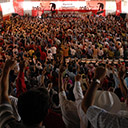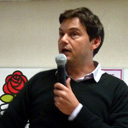
Wages for Facebook
The art campaign Wages for Facebook is an attempt to unsettle the digital marketization of our relationships that many of us have already come to accept as normal.


The art campaign Wages for Facebook is an attempt to unsettle the digital marketization of our relationships that many of us have already come to accept as normal.

The National Front of Popular Resistance (FNRP) emerged out of the opposition to Honduras’s 2009 coup and quickly developed into the largest social movement in Honduran history. Will it be able to turn things around in a country known for having the worst poverty and inequality in Latin America?

In the tech community, the plight of homeless people has gone from being an unnoticed barnacle of urban life to a cause at once mourned, criticized, and celebrated. For many in Silicon Valley, homeless people are the “noble savages” of today.

Editors: Eric Arnesen’s review (Fall 2013) of Henry Wallace’s 1948 Presidential Campaign and the Future of Postwar Liberalism, Thomas Devine’s book on Henry Wallace, troubled me, less because of what it said than because of what it didn’t. I have …

It is hard to resist a technology that is also a tool of pleasure. The Luddites smashed their power looms, but who wants to smash Facebook—with all one’s photos, birthday greetings, and invitations? New digital technologies, particularly social media, make money by encouraging us to spend our lives on their platforms; they try to turn labor that was previously paid, from drone development to sex work, into play for unpaid amateurs. To what end?

The 1964 Civil Rights Act certainly deserves a shower of golden anniversary tributes. Thanks to what Clay Risen, in his new book about its passage, calls “the Bill of the Century,” most Americans now assume and most welcome the fact …


Valerie Solanas: The Defiant Life of the Woman Who Wrote SCUM (and Shot Andy Warhol) by Breanne Fahs The Feminist Press, 2014, 352 pp. Late last year former NYPD Commissioner Ray Kelly visited Brown University to deliver a lecture on …


When he started working at the Tenth Amendment Center three-and-a-half years ago, Communications Director Mike Maharrey could recite every bill that dealt with the nullification of federal law across the United States, even if most were toothless, non-binding resolutions. In …

When my uncle Joe Meraglio was discharged from the Navy after the Second World War, he, like other young men in his Rust Belt town, went back to work for the Pennsylvania Railroad. But the railroad industry was beginning its …


Less than two years after the fall of Nazi Germany, a bankrupt Britain—reeling from the most destructive war in history and living under conditions of stark austerity—elected to create an extraordinary system of universal health care, the National Health Service …

For over half a century, Dissent made its home in what was once affectionately called in these pages “the intellectual kibbutz of Manhattan’s Upper West Side.” The neighborhood was synonymous with Jewish intellectual life. It was a small world, perhaps, …

Thomas Piketty’s Capital in the Twenty-First Century is a weighty book, replete with good information on the flows of income, transfers of wealth, and the distribution of financial resources in some of the world’s wealthiest countries. But it is not a very sound guide to policy. And despite its great ambitions, his book is not the accomplished work of high theory that its title, length, and reception (so far) suggest.

Jonathan Sperber is right to portray Marx as a product of his times. But he goes astray in limiting the application and relevance of Marx’s ideas to the relatively brief time—from 1840 to 1880—in which he wrote. If a thinker discerns deeper trends within the history of his time, he may produce ideas that are relevant well beyond his passing.

David Caute’s thought-provoking, meticulous study tells the story of the conflict between the two dominant ideologies of the last century through the lives of two of their most eloquent adherents, and the deceptions in which each of them allowed himself to engage.

The Another Self Portrait reissue comes as a vindication of the appropriateness of a “great artist” throwing off as much “product” as the market can bear. No longer a cynic for churning out releases, Bob Dylan is widely seen as wise and generous for sharing more.